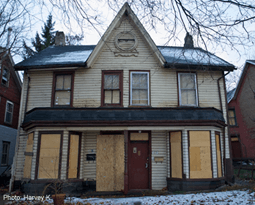Communities of Color Face Unexpected Foe in Foreclosure Prevention
Page Media

Millions of Americans are still suffering the effects of the subprime mortgage meltdown. More than four million homeowners have been foreclosed upon already, and nearly 11 million are "underwater," that is, they owe more on their mortgages than their homes are worth. But it's not just these 15 million who are suffering, that number is much larger if you count the children who live in those homes.
Think about what happens to a community where many homes are in foreclosure or where many underwater homeowners don't invest in the upkeep of their homes. Neighbors' homes lose value. Towns and cities spend more on policing, securing, and maintaining neighborhoods full of vacant homes. And, because communities of color were especially targeted for predatory loans during the subprime boom, those communities are suffering disproportionately now. Compounding the problem, many communities of color are not experiencing the recovery that has begun for some.
The federal government hasn't been able to solve this problem yet, so we shouldn't be surprised that some of the hardest-hit local communities are trying to take matters into their own hands. In places like Richmond, California, and Irvington, New Jersey, local governments are talking about using their eminent domain power to keep homeowners in their homes. Those governments could seize underwater mortgages, paying the current mortgage holders fair market value. They could then re-issue the mortgages on fairer terms, lowering homeowners' monthly payments and stabilizing their communities in the process.
You might think the federal government would be excited by this idea, since it's a creative solution where federal programs have struggled. Instead, the Federal Housing Finance Agency (FHFA) issued a statement threatening to take legal action or deny credit to communities that try to use eminent domain to modify mortgages. Strange, right? We thought so, too. When a coalition of community groups filed a Freedom of Information Act (FOIA) request, asking the FHFA for more information about its efforts to block the use of eminent domain for mortgage modification and its communications with the financial industry on that topic, the FHFA never responded.
So, the ACLU and the Center for Popular Democracy today filed a FOIA lawsuit, asking a federal judge to order the FHFA to turn over the information. We think the public deserves to know why the FHFA came out so strongly against Richmond, and Irvington, and the other suffering communities that are interested in experimenting with this solution. If the FHFA really is putting the interests of Wall Street above those of hard-hit communities, we're going to have a hard time getting the housing market back on track.
Rachel Goodman is a staff attorney with the American Civil Liberties Union.
